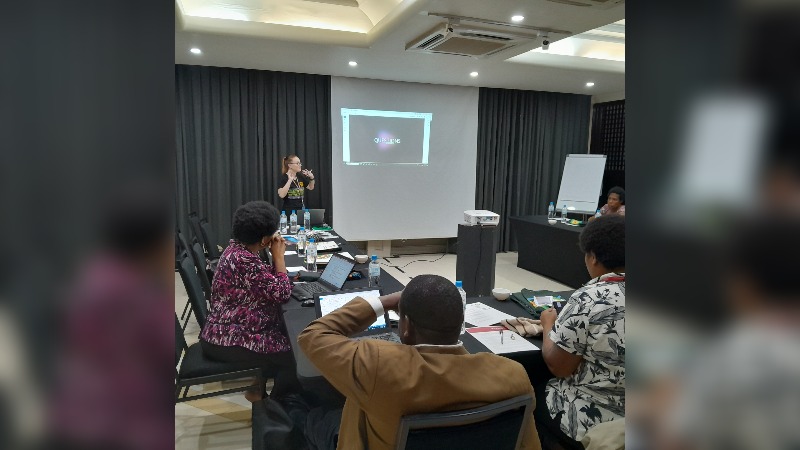United Nations Population Fund (UNFPA) in partnership with the National Department of Health, National AIDS Council Secretariat, World Vision, UNAIDS, UNICEF and the World Health Organization (WHO) are currently carrying out a three day media session including a film screening that will be held at the Paradise Cinema at the Vision City Mega Mall in Port Moresby.
The session started Tuesday the 26th of September at the Ela Beach Hotel and will conclude on Friday the 29th.
UNFPA has organized information sessions with practicing journalists educating them on the topics of antiretroviral therapy (ART), mother-to-child transmission of HIV and immunization and HIV.
These sessions aim to equip journalists with the knowledge to report on HIV and in addition introducing journalists to the subject matter experts who can be available for comment or clarification based on the topic of HIV.
The first session touched on topics based on antiretroviral therapy and the prevention of mother-to-child transmission of HIV.
UNFPA Communications Specialist, Rachel Donovan said cases of HIV in Papua New Guinea has increased by 131% since 2010, however is easily preventable which is something that needs to be addressed.
She further stated that HIV related deaths are also stabilized and that’s because of antiretroviral therapy which is free of charge and available in all parts of the country.
“According to statistics from UNAIDS, 51% of pregnant women with HIV are receiving ART and we have an estimation of about 820 new child infections where two babies per day are born with HIV and are treated for the rest of their lives.”
“Therefore to address this, the media has a tremendous platform to combat a lot of misinformation; reduce the stigma and help us to address the incidents of HIV and the types of transmissions.”
“So we are engaging media to improve testing whether that’s through attending antenatal care services making sure those tests are available at those clinics.”
“Increasing antenatal care visits ensuring people can access health care including vaccinations.”
Also speaking during the session was UNICEF Health Specialist, Doctor Garba Safiyanu, who spoke on the prevention of parent-to-child transmission (PTCT) of HIV and the importance of testing to prevent newborn infections.
He stated that the transmission of HIV from the mother to the infant can occur during pregnancy, labour and delivery and also through breastfeeding.
Dr Safiyanu further stressed that it is critical that pregnant women with HIV and their infants get the best possible antenatal, intra-partum and postpartum care they can get to prevent the infant from contracting the disease.
“The most important risk factor for PTCT is the amount of HIV in the mother’s blood which is known as the viral load and the risk of transmission to infant is highest when women’s viral load is high especially in a recent HIV infection or mothers who are not on ART.”
“Effects of HIV on pregnancies also include spontaneous abortions, still births, pre-term deliveries and low birth weight infants.”
He further strongly encouraged all pregnant women to attend antenatal clinics early to start treatment immediately if found to be tested HIV positive.
“PPTCT programs are important because this prevents HIV infections, prevent HIV transmission from women infected with HIV to their infants and provision of treatment.”
“Moreover, for pregnant women living with HIV, is crucial they deliver in a health facility so that they can be monitored and attended to when the baby is to be born.”
Moreover, he explained that once a baby is born, then he/she must then be put on ART as well to be tested three times during a period of time.
“The first test will be conducted when the baby is three weeks old, the second at three months and the third test at six months.”
“If the baby is tested negative after the third test, then he/she is considered to be fine and safe.”
Furthermore, as part of the awareness session, Dr. Safiyanu made mention that it is also important to know the main diseases that a pregnant woman can contract and must receive treatment for in order to deliver a healthy baby.
This he stated includes HIV, syphilis and hepatitis.
Meanwhile, as bringing about awareness is important, challenges faced in addressing issues like this in the country can also include stigma, discrimination, cultural and religious barriers.
Despite this, there are few who are willing to come out and speak as advocates to give a sense of confidence and comfort to those holding back.
This sees a role in media in addressing the gap in ART coverage by reducing stigma and advocating for robust commodities logistics systems in terms of ensuring there are always supplies available for testing and drugs available for those infected.

